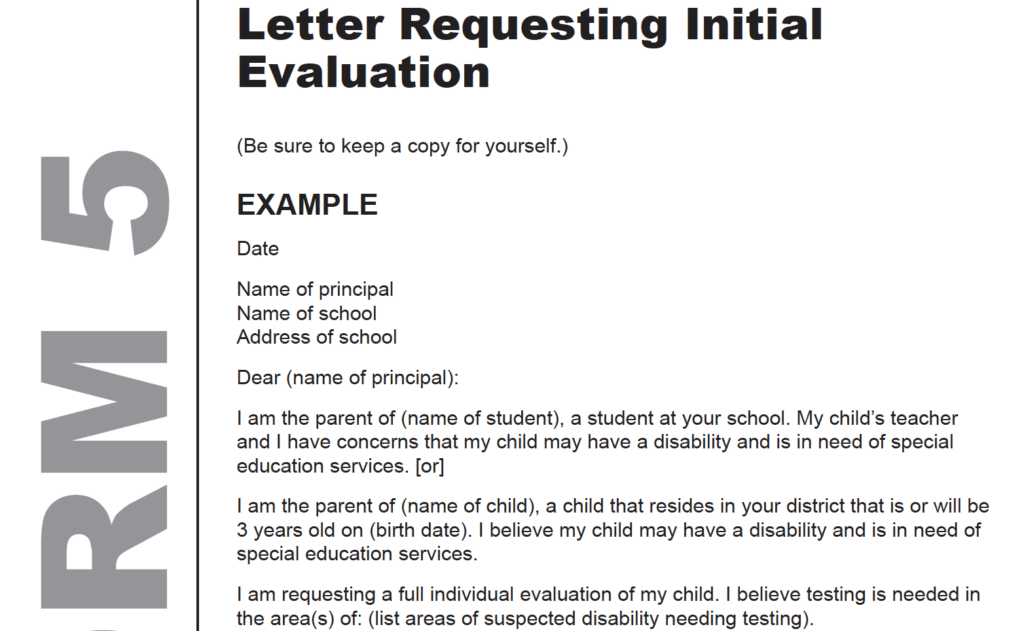Special Education Evaluations and Testing
You know that your child is struggling in school. The school says that things aren’t that bad and to give it some time, but you know your child and you know that this is not okay. You know you need help, but you aren’t sure where to begin.
Requesting a special education evaluation can be a good first step. The guide below outlines special education evaluations and testing in Texas.
What is a Special Education Evaluation?
A special education evaluation is an assessment done by your public school district for any student who is potentially eligible for special education services.
An initial special education evaluation must (1) determine if your child is a child with a disability and (2) determine your child’s educational needs.
Under federal law, a child with a disability includes any student who requires special education and related services as a result of any of the following:
- an intellectual disability,
- a hearing impairment,
- a speech or language impairment,
- a visual impairment,
- a serious emotional disturbance,
- an orthopedic impairment,
- autism,
- traumatic brain injury,
- an other health impairment,
- a specific learning disability,
- deaf-blindness,
- or multiple disabilities.
Should My Child Be Evaluated for Services?
Your school district must identify and conduct a special education evaluation for all children with disabilities, regardless of the severity of their disability, who are in need of special education and related services.
If your child is experiencing difficulty in school, all student support services should be considered by your school, including tutorial; remedial; compensatory; response to intervention; and other academic or behavior support services.
If your child continues to experience difficulty, your school district must begin the special education evaluation (or full individual and initial evaluation) process. As a parent, you may also initiate the evaluation process for your child. This evaluation is done at public expense and is at no cost to you.
A special education evaluation is an assessment done by your school district for any student who is potentially eligible for special education services.
10 Evaluation Takeaways for Parents
- You may ask your school district for a special education evaluation of your child at any time.
- Your request for a special education evaluation should be in writing.
- In your request, ask that your school evaluate your child for special education services.
- Address your written request to your school’s principal and your district’s special education director.
- Your school district has 15 school days to respond to your request, in writing.
- If the school agrees to evaluate, they must provide: (a) a written notice proposing to evaluate, (b) a copy of the procedural safeguards notice, and (c) an opportunity for you to give written consent.
- Once the school receives your signed consent, they have 45 days to conduct the evaluation.
- Once the evaluation is complete, the school has 30 calendar days to hold an ARD meeting, review the evaluation results, determine eligibility, and develop an IEP.
- If the school refuses your request, they must provide: (a) written notice refusing to evaluate and (b) a notice of procedural safeguards explaining your legal rights.
- If you are unhappy with the school district’s decision, you have the right to challenge it. Ask for a private, independent evaluation; Request Mediation; File for Due Process.
When to Ask for a Special Education Evaluation?
Special education evaluations may be requested at any time.
The school’s duty to evaluate is an affirmative one and does not require a parental request.
However, you have a right to initiate the special education evaluation process for your child whenever you believe it appropriate.
In fact, each school year, your school must provide you with written notice of the options and details surrounding special education services for your child.
This notice must inform you that you are entitled to request a special education evaluation for your child at any time.
Your school district may not reject or delay consideration of your request for an initial special education evaluation because your child has not participated in or is currently participating in RtI (Response to Intervention Strategies)
The request for a special education evaluation, however, does not need to come from you. School personnel, a school principal, parents or legal guardians, or any other person involved in the education or care of your child may make a request for special education testing and an evaluation.
How to Ask for a Special Education Evaluation or Testing?
Your request for special testing and a special education evaluation should be in writing.
Submitting your written request for a special education evaluation will legally obligate your school district to respond.
Ask your district to conduct a full individual and initial evaluation of your child in all areas of suspected disability.
- Send a written request.
- Ask that your school evaluate your child for special education services.
- Address the request to your school’s principal and your district’s special education director.
While you can submit your special education evaluation request to the school personnel familiar with your child, you should also address the request to your school district’s director of special education or a district administrative employee. Before the school can evaluate, however, parental consent is needed.
Sample Request for a Special Education Evaluation
There are many sample evaluation requests online to use as a starting point, but be sure that your request meets all requirements and is specific to your child.
The ARC of Texas and Disability Rights Texas has provided one sample request in the 2018 IDEA Manual.

How Should the School Respond to an Evaluation Request?
Your school district has 15 school days to respond to your request.
When the school district receives your written request, they have 15 school days to provide you with a response.
Under Texas law, a “school day” does not include any day after the last instructional day of the spring semester and before the first instructional day of the subsequent fall semester.
The school must respond to your request for an evaluation in writing.
There are only two potential responses from the school: agree to evaluate or refuse to evaluate.
- Agree to Evaluate: If the school agrees to evaluate your child, the district must provide you with prior written notice of the district’s proposal to conduct a special education evaluation; a copy of the procedural safeguards notice; and an opportunity to give written consent for the evaluation. The evaluation must be conducted by a group of qualified professionals.
- Refuse to evaluate: However, if the school decides not to evaluate your child, the district must provide you with prior written notice of the district’s refusal to conduct a special education evaluation, and a copy of the procedural safeguards notice.
What Happens if the School Agrees to Evaluate?
The school has 45 school days to conduct the evaluation after receiving your signed consent.
Within 45 school days of receiving your written consent for the evaluation, the school district must complete a written special education evaluation report, including parent and teacher input and related standardized tests (or a full individual and initial evaluation) of your child. This evaluation is done at a public expense.
That timeline can be extended if your child is absent from school. Three or more absences during the 45 school day evaluation period will extend the deadline.
Additionally, the timeline is also adjusted if the school receives your consent within fewer than 45 school days before the last instructional day of the school year.
Importantly, consent to the special education evaluation does not give the school permission to provide special education services. You can provide that parental consent at a later time.
What Happens When the Evaluation Is Complete?
- hold an ARD meeting,
- review the evaluation results,
- determine eligibility and
- develop an IEP
Within 30 calendar days from the completion date of your child’s initial special education evaluation, the IEP team (ARD committee) must hold a meeting to determine your child’s eligibility. Once the evaluation report is complete, you have a right to review it.
If your child qualifies for special education services, the ARD committee must also develop an individual education plan. The plan should detail the educational program for your child.
In many cases, the ARD timeline can be extended. For example, if the 30 calendar days fall during the summer when school is not in session, the ARD committee has until the first instructional day of the fall semester to finalize initial eligibility decisions.
What if You Are Not Satisfied With the Evaluation?
If the school decides not to evaluate, you may challenge the school’s decision.
If your school district decides not to conduct a special education evaluation of your child because they do not suspect a disability, you may challenge the school’s decision by requesting a due process hearing.
You can ask for a second opinion if you are unhappy with the school district’s evaluation.







